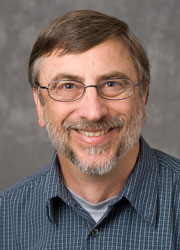
Ph.D. - 1978 - University of Wyoming
Postdoc - 1978-82 - University of Washington
Signals transduced by the binding of antigens to receptors on hematopoietic cells take the form of increased tyrosine phosphorylation of intracellular proteins. This response is mediated by cytoplasmic protein-tyrosine kinases that associate with the liganded receptor. The major focus of our laboratory is on understanding how these kinases are regulated and how, once activated, they regulate the multiple biochemical pathways that are activated by receptor engagement. The kinase of particular interest is Syk, a 72-kDa, cytoplasmic protein-tyrosine kinase originally discovered in our laboratory. We use chemical, biochemical and genetic approaches to understanding the role of each of these enzymes in signal transduction pathways downstream from B cell antigen receptors. Recent studies indicate additional roles for Syk in modulating the growth properties of many types of cancer cells. Syk is a prominent promoter of the survival of multiple tumor cells including many leukemias, lymphomas, retinoblastomas and pancreatic carcinomas. In contrast, Syk is frequently lost from many highly metastatic cells including breast cancers and melanomas. The molecular mechanisms by which Syk functions both as a tumor promoter and a tumor suppressor are of major interest to the lab.
Functional Analyses of Syk in B Cells and Cancer Cells: B cells fail to develop properly in mice lacking the gene for Syk due to the inability of the B cell antigen receptor (BCR) to signal in the absence of the kinase. How Syk mediates signaling through the BCR is a major question being investigated. We have mapped multiple sites of phosphorylation on Syk that are important for its ability to function in B cells. By site-directed mutagenesis and expression studies, we are exploring the role of these phosphorylations in the ability of Syk to complement signaling in Syk-deficient cells. We have also identified regions of Syk required for its translocation into and out of the nucleus. The role that Syk's nucleocytoplasmic translocation plays in modulating the properties of B cells and cancer cells is actively under investigation. In collaboration with Dr. Andy Tao, we are making extensive use of phosphoproteomics approaches to identify novel Syk substrates in both B cells and breast cancer cells. The analysis of novel substrates identified through these approaches is currently underway. These studies have led to the discovery of an interaction of Syk with stress granules, ribonucleoprotein complexes involved in mRNA triage during stress. The association of Syk with stress granules promotes their clearance from cells through autophagy. Interestingly, stress granules form readily in brain microglial cells, leading the sequestration of active Syk, promoting microglial cell activation, but inhibiting phagocytosis. Abundant stress Syk-associated stress granules are found in the brains of patients with Alzheimer's disease.
Interactions of Syk with Intracellular Proteins: Through the use of genetic, biochemical and proteomic screens, we are identifying and characterizing novel Syk-interacting proteins that are involved in the signal transduction pathways operating downstream of the activated kinase. In collaboration with Dr. Carol Post, we are examining the structural bases for the interactions between Syk and Syk-binding proteins, especially those containing SH2 and other phosphotyrosine-binding domains.
Ghosh, S., and Geahlen, R.L. (2015) Stress granules modulate SYK to cause microglial cell dysfunction in Alzheimer's disease. eBioMedicine 2:1785-1798.
Krinsenko, M.O., Higgins, R.L., Ghosh, S., Zhou, Q., Tybula, J.S., Wang, W.-H., and Geahlen, R.L. (2015) Syk is recruited to stress granules and promotes their clearance through autophagy. J. Biol. Chem. 290, 27803-27815.
Cartagena, A., Wang, W.-H., Geahlen, R.L., and Raman, A. (2015) Fast, multi-frequency, quantitative nanomechanical mapping of live cells using the atomic force microscope. Sci. Rep. 5:11692.
Krisenko, M.O. and Geahlen, R.L. (2015) Calling in SYK: SYK's dual role as a tumor promoter and tumor suppressor in cancer. Biochim. Biophys. Acta 1853, 254-263.
Wang, W.-H., Childress, M.O., and Geahlen, R.L. (2014) Syk interacts with and phosphorylates nucleolin to stabilize Bcl-xL mRNA and promote cell survival. Mol. Cell. Biol. 34, 3788-3799.
Krisenko, M.O., Cartagena, A., Raman, A., and Geahlen, R.L. (2014) Nanomechanical property maps of breast cancer cells by multi-harmonic atomic force microscopy reveal Syk-dependent changes in microtubule stability mediated by MAP1B. Biochemistry 54. 60-68.
Geahlen, R.L. (2014) Getting Syk: Spleen tyrosine kinase as a therapeutic target. Trends Pharmacol. Sci. 35, 414-422.
Jayasundera, K.B., Iliuk, A.B., Nguyen, A., Higgins, R., Geahlen, R.L., and Tao, W. A. (2014) Global phosphoproteomics of activated B cells using complementary metal ion functionalized soluble nanopolymers. Anal. Chem. 86, 6363-6371.
Xue, L., Geahlen, R.L., and Tao, W.A. (2013) Identification of direct kinase substrates based on protein kinase assay-linked phosphoproteomics. Mol. Cell. Proteomics 12, 2969-2980.
Huang, R., Oh, H., Arrendale, A., Martin, V.A., Galan, J., Workman, R.J., Stout, J.R., Walczak, C.E., Tao, W.A., Borch, R.F., and Geahlen, R.L. (2013) Intracellular targets for a phosphotyrosine peptidomimetic include the mitotic kinesin, MCAK. Biochem. Pharmacol. 86, 597-611.
Yu, S., Huang, H., Iliuk, A., Wang, W.-H., Jayasundera,K.B., Tao, W.A., Post, C.B., and Geahlen, R.L. (2013) Syk inhibits the activity of protein kinase A by phosphorylating tyrosine 330 of the catalytic subunit. J. Biol. Chem. 288, 10870-10881.

